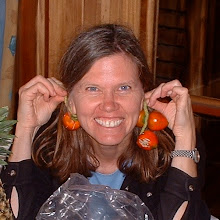I usually don't go on a spree of stitching multiple temari balls using the same stitch right after each other, but I just finished a series of four balls. They all used the flax leaf stitch. Maybe that's because I think it looks cool and refreshing and the weather has been anything but.
I learned how to do this stitch from Barbara Suess's fantastic new book Temari Techniques.
Next I stitched a ball that is my first original design. I filled a couple of areas with smaller versions of the flax leaf. Small flax leaves can be used to fill many different shapes and most of it is by eye without any measuring. That makes it very relaxing.
Finally, I did a couple of balls that were based on instructions in a book I have from Japan called Cosmo 4 (Atarashii Temari by Chiyoko Ozaki). This was the first time that I followed instructions from a book all in Japanese, using the diagrams. Being able to do so will open up all kinds of possibilities. Fortunately I had help from Barb's book to learn the flax stitch and the mitsubishi stitch, shown on the right.
I learned how to do this stitch from Barbara Suess's fantastic new book Temari Techniques.
Next I stitched a ball that is my first original design. I filled a couple of areas with smaller versions of the flax leaf. Small flax leaves can be used to fill many different shapes and most of it is by eye without any measuring. That makes it very relaxing.
Finally, I did a couple of balls that were based on instructions in a book I have from Japan called Cosmo 4 (Atarashii Temari by Chiyoko Ozaki). This was the first time that I followed instructions from a book all in Japanese, using the diagrams. Being able to do so will open up all kinds of possibilities. Fortunately I had help from Barb's book to learn the flax stitch and the mitsubishi stitch, shown on the right.


















